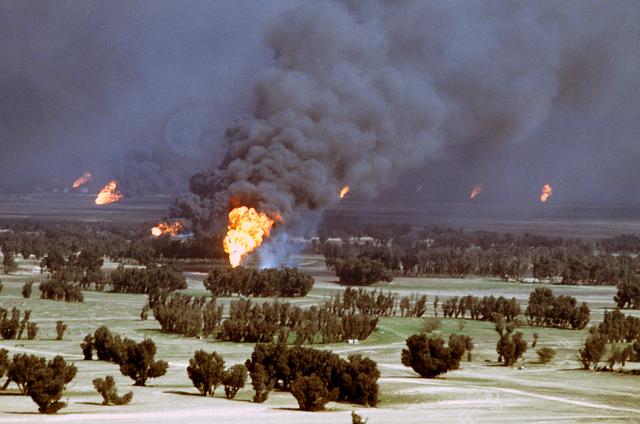You are hereBlogs / Steve Horn's blog / Tar Sands Trade: Kuwait Buys Stake in Alberta As It Opens Own Heavy Oil Spigot
Tar Sands Trade: Kuwait Buys Stake in Alberta As It Opens Own Heavy Oil Spigot
Cross-Posted from DeSmogBlog
Chevron made waves in the business world when it announced its October 6 sale of 30-percent of its holdings in the Alberta-based Duvernay Shale basin to Kuwait Foreign Petroleum Exploration Company (KUFPEC) for $1.5 billion.

Photo Credit: Oil Fires in Kuwait During First Gulf War | Wikimedia Commons
It marked the first North American purchase for the Kuwaiti state-owned oil company and yields KUFPEC 330,000 acres of Duvernay shale gas. Company CEO and the country's Crown Prince, Sheikh Nawaf Al-Ahmad Al-Jaber Al-Sabah, called it an "anchor project" that could spawn Kuwait's expansion into North America at-large.
Kuwait's investment in the Duvernay, at face-value buying into Canada's hydraulic fracturing ("fracking") revolution, was actually also an all-in bet on Alberta's tar sands. As explained in an October 7 article in Platts, the Duvernay serves as a key feedstock for condensate, a petroleum product made from gas used to dilute tar sands, allowing the product to move through pipelines.
And while Kuwait — the small Gulf state sandwiched between Iraq and Saudi Arabia — has made a wager on Alberta's shale and tar sands, Big Oil may also soon make a big bet on Kuwait's homegrown tar sands resources.
"Kuwait has invited Britain’s BP, France’s Total, Royal Dutch Shell, ExxonMobil and Chevron, to bid for a so-called enhanced technical service agreement for the northern Ratqa heavy oilfield," explained an October 2 article in Reuters. "It is the first time KOC will develop such a big heavy oil reservoir and the plan is to produce 60,000 bpd from Ratqa, which lies close to the Iraqi border [in northern Kuwait]...and then ramp it up to 120,000 bpd by 2025."
In the past, Kuwait has said it hopes to learn how to extract tar sands from Alberta's petroleum engineers.
Canadian Tutelage
Back in 2007, Kuwait had much more ambitious plans for the Ratqa oil field.
Though the current goal is to suck 120,000 barrels per day of heavy oil out of the field, back in 2007 the goal was 900,000 barrels per day by 2020. And Alberta's petroleum engineers would lend their expertise to the cause, or at least that was the plan for Kuwait Oil Company at the time.
"Unless we seek the experience of the industry here, we will not be able to reach our target," Ali al-Shammari, at the time the deputy managing director for finance for the Kuwait Oil Company, told the Calgary Herald. "We will need [international oil companies'] help in developing the reservoirs and may also consider the options of signing enhanced technical services agreements."
Kuwait's entrance into Canada depicts how important Alberta's tar sands have become for the global geopolitical landscape. And Kuwait opening its doors to the oil majors depicts the country as an emerging player in the global oil market.
Geopolitics At Play
The Islamic State — formerly known as the Islamic State in the Levant (ISIL)— has established what it calls a Caliphate in both northern Iraq and large swaths of Syria.
Fueled by $25 to $60 per barrel oil sold on the black market, Kuwait has largely escaped from the day-to-day newscycle. But as the famous Mark Twain quip goes, "History doesn't repeat itself, but it does rhyme."
The Ratqa oil field is the same geological formation as the Rumaila oil field, which sits in southern Iraq. Iraq and Kuwait fought a war over the field in early-1990s, in which the United States lead the call to arms against former President Saddam Hussein: Operation Desert Storm, the first Gulf War.
In 2010, Iraq and Kuwait signed an agreement — an armistice really — to share the border oilfield.
Further, Wikileaks U.S. Department of State diplomatic cables made public by whistleblower Chelsea Manning show that the U.S. government has kept a close eye on the Ratqa oil field, as well as on which U.S.-based oil companies stood to win and lose if developed.
Though almost two and a half decades have gone by since Operation Desert Storm and Saddam Hussein is no longer even alive, one thing remains constant: oil still runs the show in the Persian Gulf region. And this time around, it's tar sands oil — the same oil running the show in Alberta.
- Steve Horn's blog
- Login to post comments
-

- Email this page
- Printer-friendly version






